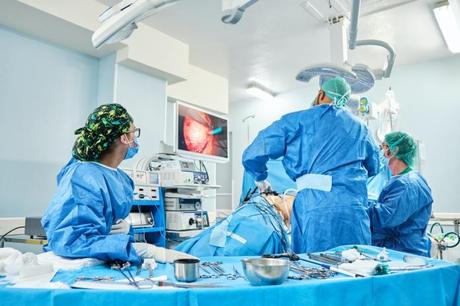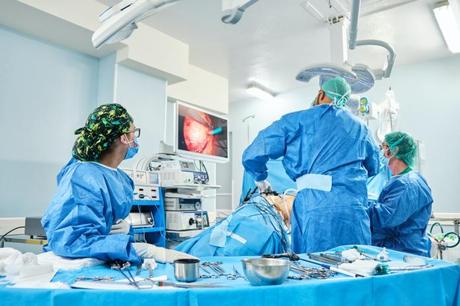Due to the quick adoption of laparoscopic procedures, laparoscopic surgery has unquestionably evolved into a minimally intrusive operation. Reduced hospital stays, faster return to normal activities after surgery, faster wound healing, and increased mobility are all results of technological breakthroughs. Still, it's normal to have anxieties about dangers, discomfort, healing, etc. So as to make everything go smoothly, here is a guide.
Recovery after Surgery: Returning to Normal - 20 things to keep in mind :


1) Regular household tasks
While it's crucial to rest, one should begin performing regular household tasks after one to two weeks. Lifting should only be done with lightweight objects, though.
2) Avoid labour- intensive chores
Don't do any labor-intensive chores for four weeks following the operation because it can prevent internal healing.
3) Light exercise
Light exercise, such as walking, will aid in rehabilitation and hasten the healing process.
4) Trip plans
To prevent discomfort and the danger of deep vein thrombosis, postpone your vacation plans while you are recovering (DVT). If it is inevitable, talk about the trip with your doctor to get advice.
5) Maintaining your diet
It's crucial to eat healthily after this major operation to recuperate more quickly. since eating the appropriate foods helps prevent issues like constipation and excessive blood sugar. They are also essential for boosting the protein levels in your body, which will speed up healing.
6) Adding fiber to your diet
Please use as much fibre as you can in your recipe. It is necessary for the recovery process. High-fiber foods not only aid in healing but also in avoiding problems like constipation. After surgery, constipation is frequently experienced. It is quite annoying since it makes the pain worse and may even make hospitalisation more likely.
7) What to eat after your surgery
Therefore, supplement your diet with foods high in fibre, such as psyllium husks, and eat more of them. It has been demonstrated that getting fibre naturally is better. Foods high in fibre include:
Whole grain bread: Eat whole-grain bread that is dark in colour and contains entire grains. Bread that has been refined is a poor source of fibre.
Fruits: Fresh fruit is a great source of vitamins and fibre.
Cereals: Not all cereals have a lot of fibre. Prior to purchasing, make sure to read the label carefully. It ought to be high in fibre and low in sugar. Make sure your cereal has fibre that has a name. Oatmeal and cream of wheat are two well-known breakfast ingredients.
Vegetables: Vegetables are one of the best sources of fibre. Additionally, you can buy it fresh or frozen.
8) After surgery, refrain from driving or consuming alcohol for at least 24 hours.
9) After surgery, you can take a bath at any time.
10) The morning following the procedure, you can take off the bandage. After surgery, steri-strips, which resemble tape, can be taken off two to three days later.
11) After surgery, you can usually start working again three days later. Please seek a note from your doctor excuse you from work during your pre-operative checkup if you require one.
12) If your pee is green, you shouldn't be alarmed. Your fallopian tubes may have been examined with a blue dye to see if they are open.
13) After a laparoscopy, you could feel some discomfort, much like after many procedures. These discomforts could consist of:
14) Up to one month after a laparoscopy, vaginal bleeding is typical. After surgery, many women experience their next regular menstrual cycle four to six weeks later. You can experience greater bleeding and more discomfort than usual when your regular period resumes.
Examine your condition's improvement after two to three menstrual cycles to see if laparoscopy was effective.
15) Once you are awake after a brief general anaesthesia, you will be given something light to eat and a drink of water or tea before being sent home.
16) Showering
24 hours following your surgery, you should be able to take a shower or bath and take off any dressings. It is a good idea to have someone at home with you when you first take a shower or bath so they can assist you if you start to feel lightheaded or dizzy. Don't be concerned if your scars become wet; simply make sure to pat them dry with clean, disposable tissues or allow them to air dry. Keeping scars dry and clean promotes healing.
17) Being exhausted
After your surgery, you can feel much more exhausted than usual since your body is utilising a lot of energy to recuperate. For the first several days, you might need to nap during the day. This is the last symptom to become better for many women.
Also Read Importance of Environment to Humans
18) Daily schedule is prime
Make a daily schedule and stick to it. Try to rise at the same time every day, for instance, to shower, dress, and walk around. Staying in bed all day and sleeping in can make you feel down. Try to finish your tasks and then take a nap if you need to.
19) Hormone Replacement Therapy
You might be offered hormone replacement therapy if your ovaries were removed during surgery (HRT). Your gynaecologist will discuss this with you, and you two may decide on the best course of action.
20) Withdraw from smoking
Quitting smoking will improve your health in a variety of ways, including lowering your chance of chest problems or wound infections after anaesthesia. Even if it's simply while you're recovering, quitting smoking will improve your health right away. You might need to carry nicotine replacement therapy to use while you're in the hospital if you're unable to quit smoking before your procedure. Smoking is not permitted in hospitals. Ask the nurse at your GP office for details about a clinic that offers smoking cessation services in your area.
Here's all you'll need to keep in mind after you go through a laproscopic surgery. Your body might feel a little weak and uncomfortable but it's all going to pay off in the end. You might be in a complex at first if you want to get this surgery done or not, but if you have made up your mind, just don't be tensed and it's gotta be amazing!

